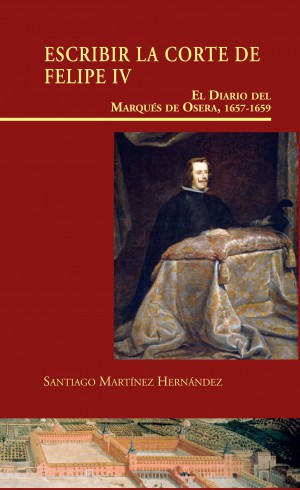Author
Santiago Martínez Hernández (ed.)
Characteristics
1286 pages; 74 black and white and color illustrations; hardcover; 14,5 x 23 cm
Publication
Spanish; jointly published with Doce Calles and the Fundación Cultural de la Nobleza Española; 2013
ISBN
978-84-15245-34-6
Price
€47,12
On 25 August 1657 Francisco Jacinto de Funes Villalpando y Ariño, Marquis of Osera, reached the city of Madrid after a long journey from Saragossa. It was not the first time the Aragonese gentleman set foot in the capital, but on this occasion he did so with the commitment of clearing his family’s name. His brother Don José de Villalpando, commander of the Lisbon infantry regiment, had been confined to the public prison of Barcelona since the beginning of the year, charged with having forced and promised to marry a young Catalan lady related to the aristocracy of the Principality. Osera took it upon himself to defend him and travelled to Madrid with the aim of reducing what looked set a priori to be a death sentence.
Determined to provide a detailed account of all his moves and of the result of his appeals to Philip IV and the negotiations with the royal favourite, grandees, aristocracy, ministers and secretaries, the marquis, a poet of middling talent and an amateur playwright, wrote a Diary in his own hand. Begun on the very day of his arrival, it ended hastily at the end of June 1659 when, on the day before the final judgement was issued sentencing Don José to four years’ exile in Oran, Osera had to return to Aragon to be sworn in as a deputy representing the high nobility.
The manuscript, which has remained practically unpublished until now in the archives of the Dukes of Alba, is revived in all its originality in this edition as its contents are fully published, including the parts of which we were hitherto unaware as they were originally ciphered.
Osera ended up making the Diary, devised as a means of communicating with his brother, not only an authoritative and insightful portrait of the court of the waning Planet King but also, inadvertently, a ‘mirror for gentlemen’, a metaphor of the representation of the aristocratic ethos in the Spanish Golden Age.
Santiago Martínez Hernández holds a doctorate in Modern History from the Universidad Complutense in Madrid, where he is full professor. His studies focus on court politics of the reigns of Philip II and Philip III, and he has published El marqués de Velada y la corte en los reinados de Felipe II y Felipe III (2004) and Governo, Politica e Representações do Poder no Portugal Habsburgo e nos seus Territórios Ultramarinos (1581-1640) (2011), among other studies, as well as twenty or so articles and chapters in books.

